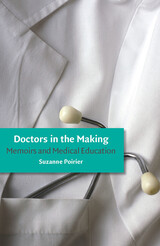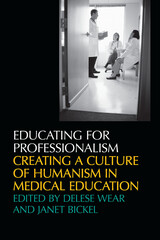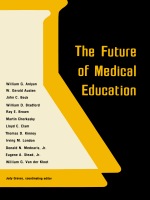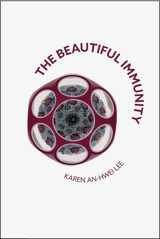
Through close readings of these accounts, Poirier draws attention to the complex nature of power in medicine, the rewards and hazards of professional and interpersonal relationships in all aspects of physicians’ lives, and the benefits to and threats from the vulnerability that medical students and residents experience.
Although most students emerge from medical education as well-trained, well-prepared professionals, few of them will claim that they survived the process unscathed. The authors of these accounts document—for better or for worse—the ways in which they have been changed. Based on their stories, Poirier recommends that medical education should make room for the central importance of personal relationships, the profound sense of isolation and powerlessness that can threaten the wellbeing of patients and physicians alike, and the physical and moral vulnerability that are part of every physician’s life.

The thirteen essays in Educating for Professionalism examine the often conflicting ethical, social, emotional, and intellectual messages that medical institutions send to students about what it means to be a doctor. Because this disconnection between what medical educators profess and what students experience is partly to blame for the current crisis in medical professionalism, the authors offer timely, reflective analyses of the work and opportunities facing medical education if doctors are to win public trust.
In their drive to improve medical professionalism within the world of academic medicine, editors Delese Wear and Janet Bickel have assembled thought-provoking essays that elucidate the many facets of teaching, valuing, and maintaining medical professionalism in the middle of the myriad challenges facing medicine at the dawn of the twenty-first century.
The collection traces how the values of altruism and service can influence not only mission statements and admission policies but also the content of medical school ethics courses, student-led task forces, and mentoring programs, along with larger environmental issues in medical schools and the communities they serve.
Stanley Joel Reiser
Jack Coulehan
Peter C. Williams
Frederic W. Hafferty
Richard Martinez
Judith Andre
Jake Foglio
Howard Brody
Sheila Woods
Sue Fosson
Lois Margaret Nora
Mary Anne C. Johnston
Tana A. Grady-Weliky
Cynthia N. Kettyle
Edward M. Hundert
Norma E. Wagoner
Frederick A. Miller
William D. Mellon
Howard Waitzkin
Donald Wasylenki
Niall Byrne
Barbara McRobb
Edward J. Eckenfels
Lucy Wolf Tuton
Claudia H. Siegel
Timothy B. Campbell


Medicine in the twenty-first century will be very different from the medicine of today; scientific, technological, economic, and ethical conditions of practice will be transformed. What do these changes portend for medical education? What knowledge should all medical students acquire? How can medical educators prepare students in the most cost-effective way?
This book describes efforts made at Harvard Medical School during the past to reorient general medical education. Harvard’s New Pathway has received national attention since its inception—including a multipart special on PBS’s Nova—because it offers a radical restructuring of the traditional medical school curriculum. Its creators, most of them contributors to this book, designed a program that gives students not only a core of scientific, biomedical, and clinical knowledge but also the skills, tools, and attitudes that will enable them to become lifelong learners, to cope with and use new information, and—most important—to provide better patient care.
New Pathways to Medical Education also tells the inside story of how a traditional and research-oriented faculty was persuaded to cooperate with colleagues outside their departments in adopting a student-centered, problem-based approach to learning. Central to this transformation was the Patient–Doctor course, which the book describes in detail. This course—which teaches students to LISC the patient–doctor relationship for the benefit of patients—is considered one of the most significant contributions to medical education in the New Pathway.
New Pathways to Medical Education will inspire physicians, medical scientists, and medical educators around the world to think and act more decisively to reform medical education. And because it documents the development of an innovative curriculum, this study will interest educators in all fields.

This book describes and contrasts various psychiatric teaching programs in medical schools. After an examination of the differing and frequently unsatisfactory states of these programs, it also proposes a comprehensive plan for the future.
In preparing this study the author visited numerous medical schools, observing a wide range of teaching methods, goals, and facilities. His aim here is fourfold: to describe and compare existing medical school psychiatry programs in detail; to illustrate by example and anecdote the relation of teachers and students to these programs; to construct a synthesis of existing psychiatry programs that will offer optimum training and to outline a new program based on this synthesis and some additional proposals; and finally to show how methodology is a crucial but as yet unappreciated part of many psychiatry programs.
Dr. Werkman attempts to be a reporter in depth to his psychiatric colleagues about new and important developments in modern psychiatric teaching. The great scope and variety which the field of psychiatry has acquired since the Second World War has often meant that psychiatrists know little in detail of what their colleagues are doing. The author finds as well that there is often a lack of communication both within a single department and between departments in different medical schools, and that the attitude of many non-psychiatrists on the faculties ranges from ignorance to hostility--an attitude often reflected by the students.


“In recent decades, the deficiencies of our system of medical education and medical care have become clearer and more comprehensible to an expanding and highly vocal segment of the public. Many educators share the uneasiness and recognize the need for change.” These words from Dr. John Knowles's Preface define the context of this collection of thought-provoking essays, originally presented in 1966 as a series of lectures sponsored jointly by the Lowell Institute of Boston and Massachusetts General Hospital.
Written by seven men distinguished in the fields of medicine, education, and government, they are addressed to everyone, expert and layman alike, concerned with the quality of medical care in the United States. The ultimate aim of medicine is to enhance the quality of life by the prevention of disease and the comprehensive care of the sick. Technological advances continually provide us with new and better tools, but medicine is plagued by rising costs, inefficient use of facilities and personnel, and critical shortages of manpower. Each author, from his particular point of view, recognizes the need to bring medicine into contact with the social sciences, and presents concrete proposals for government aid and curriculum reform.
READERS
Browse our collection.
PUBLISHERS
See BiblioVault's publisher services.
STUDENT SERVICES
Files for college accessibility offices.
UChicago Accessibility Resources
home | accessibility | search | about | contact us
BiblioVault ® 2001 - 2024
The University of Chicago Press









